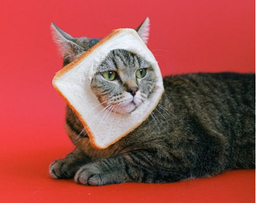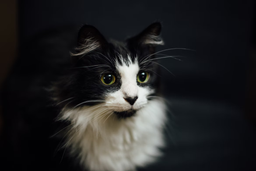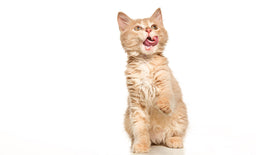Is your cat drinking milk all the time? You should try to break the habit
Should your cat be drinking milk? Most people believe that cats benefit from dairy, but that's not the case.
Untamed answers the following common questions regarding felines and milk:
- Is milk harmful to cats?
- What happens when a cat drinks milk?
- What dairy products can cats have?
- Should you avoid feeding your cat dairy products altogether?
- How come feeding milk is widely accepted?
- Why do cats like milk?
We’ll also explain the basics of healthy feline nutrition and an adequate cat diet!
What happens when a cat drinks milk?
Felines are drawn to milk because of its taste and fat content, but it's bad for them due to the high lactose levels (milk sugar).
In case your cat has a severe case of lactose intolerance, they'll display the following symptoms 12–24 hours after consuming dairy products:
To properly digest milk, cats need an enzyme called lactase which breaks down the indigestible sugar lactose into digestible sugars—glucose and galactose. Kittens produce lactase until they reach six months of age, but after that, most cats are lactose intolerant.
Dairy allergy is way more dangerous than lactose intolerance, but vets claim that only 0.01% of cats are allergic to casein (a specific protein in milk)
It may be hard to tell the difference between allergies and intolerance at first because the symptoms are similar. Considering how dangerous allergies can be, take your cat to the veterinarian as soon as you notice the symptoms mentioned above. Allergic reactions are difficult to treat and often require medication. Without adequate and prompt treatment, they can lead to anaphylactic shock and death.
Does age play a part in your cat's reaction to milk?
The biotic processes happening in your cat’s body change from kittenhood to adulthood.
Let’s examine the effect milk has on:
Can kittens drink milk?
Kittens should only drink:
- Their mother’s milk (while nursing)
- Kitten milk replacer (while nursing and during weaning)
Although it produces lactase, the sensitive digestive system of kittens could react badly to cow or other types of milk because of the inadequate nutrient profile.

What would happen if I were to take a nap right now...
Source: Pexels
Should adult and senior cats have milk?
Once lactase production ceases, cats become completely lactose-intolerant. In other words, adult cats shouldn’t have milk.
Senior cats, especially those with underlying medical conditions, could have even more trouble with the gastrointestinal issues caused by lactose intolerance. Older felines are prone to various chronic conditions and age-related illnesses, so keeping them on a healthy diet is essential for their well-being.
Why is milk harmful to felines?
Lactose and casein are not the only reasons why milk is a poor nutritional choice. Check out the table below for more details:
|
The harmful aspect of milk |
Details |
|
High calorie content |
100 ml of milk contains more than half of the recommended daily calorie intake for an average-sized cat |
|
High fat content |
If your cat doesn’t have an adverse reaction to milk, regular consumption might cause weight gain, clogged arteries, heart disease, hyperlipidemia, creation of lipid deposits |
|
Sugar |
Various dairy products contain added sugar. Despite your cat needing up to 3% carbohydrates in their daily food intake, sugar shouldn't be part of their diet because it leads to obesity and diabetes |
|
Preservatives and artificial flavouring |
Your cat’s diet should be natural and complete. Some vets claim that artificial flavouring and sweeteners often present in dairy products cause addiction in cats, which makes switching your feline from their old diet to a better one significantly more difficult |
|
High calcium content |
While good for humans, the high calcium content in milk is harmful to cats and can cause renal failure (kidneys work on a suboptimal capacity or fail to work at all) |
What milk can cats have (if any)?
Let’s examine different kinds of milk and find out whether cats can drink them:
|
Milk |
Can cats have it? |
Why? |
|
Cow |
No |
It causes severe gastrointestinal problems, which can lead to:
|
|
Goat |
Yes (in small amounts) |
|
|
Human-grade lactose-free milk |
Yes (in small amounts) |
It does not cause lactose-induced gastrointestinal problems and works as a treat, but it is not nutritious enough to replace meat |
|
Special cat milk |
Depends on the product |
Whether your cat can consume special cat milk depends on the nutritional value of the product. Unfortunately, the ingredient list in most cat milk products includes:
|
|
Soya milk |
No |
Soya can cause liver damage or failure in your cat |
|
Other plant-based milk substitutes (rice, almond, coconut, etc.) |
No |
Despite lacking lactose, plant-based milk substitutes contain other sugar your feline might struggle to digest, such as stachyose and raffinose. It’s difficult to find human-grade plant-based milk that doesn’t cause stomach upsets in your cat |
The recommended feeding amount for dairy products is one teaspoon per day. Keep in mind that cats are carnivores, and no milk can replace meat, which contains all essential micronutrients, such as taurine and arginine.

Mum, there’s something in my lunch. Please, take it out!
Source: Pexels
What is milk of magnesia?
The name of this product might confuse cat parents who aren’t familiar with it. Milk of magnesia is a medicine used to treat symptoms of various gastrointestinal problems. It resembles milk and contains magnesium, hence the name.
It’s both an antacid and laxative as it:
- Reduces the acidity in the stomach, which helps treat heartburn, indigestion, and stomach upsets
- Draws water into the intestines, which causes them to move
What does this have to do with cats? Vets claim that you can let your cat have some milk of magnesia if they’re constipated.
Should I give my cat milk or water, then?
Filtered water is the best for hydration because it:
- Has no calories
- Contains no problematic ingredients, such as sugar, preservatives, indigestible proteins, and artificial colouring and flavouring
Cats need 60 ml of water daily for every kilo of their body weight to stay hydrated.

She can have it in her coffee, but I can’t have it for lunch? That’s not fair!
Source: Pexels
Why is it important to keep your cat hydrated?
Up to 70% of your cat’s body weight is water, and it’s essential for proper:
- Food ingestion and digestion
- Temperature regulation
- Nutrient absorption
- Detoxification
Dehydration is the leading cause of urinary tract infections, such as cystitis, kidney disease, and struvite crystals.
Did you know that bodies of mammals shut down after losing only one-tenth of their water content? According to many veterinarians, UTIs are the third leading cause of death in senior cats, and proper hydration can prevent that from happening.
Easy ways to keep your cat hydrated
If you’re looking to increase your cat’s daily water intake, try the following methods:
- Serve wet cat food whenever possible—Thanks to its high moisture content (up to 80%), wet food is ideal for keeping your cat hydrated
- Pour a little water over cat biscuits—Water helps release the flavour of dry cat food and makes it easier for your cat to chew and digest it, especially if they have dental issues
- Add some soup or broth (bone or chicken, ideally) to your cat’s food—Works the same as water but provides more nutritional value thanks to the vitamins and minerals released during cooking and enhances the taste of your cat’s food even more
My cat doesn’t drink enough water. What should I do?
There are many reasons why cats don’t want to drink water, such as:
- The water dish is dirty or smelly—Opt for a stainless steel dish and clean it regularly
- Something fell into their water dish—Check the dish occasionally and change the water when needed
- The water is too hot or too cold—Cats prefer cold water from the tap. Veterinarians don’t recommend keeping water for cats in the refrigerator unless it’s summer
If you tried everything, but your cat still doesn’t want to drink water, you should call your vet immediately.
Hydration is nothing without good nutrition
To meet basic feline nutritional needs, your cat’s diet must contain the following essential nutrients:
|
Nutrient |
Recommended daily intake |
Sources |
|
More than 50% |
||
|
Fat |
Up to 20% |
What and how much should I feed my cat?
You can choose between the following types of cat food:
- Wet
- Dry
- Semi-moist
- Combination of wet and dry (mixed or as separate meals)
Dry and semi-moist food is typically not good for cats because it contains a lot of salt, sugar, taste enhancers, preservatives, and other harmful ingredients, although the quality depends on the particular product.
The portions depend on your cat’s age, breed, and activity, but most vets agree that you should feed them:
- 20 calories per half a kilo of body weight for indoor cats
- 35 calories per half a kilo of body weight for outdoor cats
Symptoms of nutritional deficiency
If your cat’s diet is inadequate, the following might occur:
- Itchy skin
- Food rejection (the change in eating habits will be noticeable for any type of food, not only wet or dry)
- Lethargy and fatigue
- Weight loss
- Incoordination
- Seizures
- Abnormal (lack of) growth
- Low milk production in pregnant and nursing cats
- Dull and harsh coat
The current craze about vegan cat food is a common cause of nutritional deficiency in cats. Felines are carnivores and lack the enzymes required to break down and absorb plant protein, making vegan cat food a poor dietary choice.
How to recognise and buy good cat food
When cat food shopping, look for:
- Products labelled as natural, organic, and complete—These labels guarantee that the ingredients used in food production are free of harmful fillers and artificial ingredients and nutritionally sufficient for cats
- Short ingredient lists—These typically indicate a brand’s transparency, but it’s a double-edged sword. Many brands group their ingredients to seem more trustworthy. If you see the terms “animal byproducts” or “meat derivatives,” you should avoid the product because it can contain slaughterhouse scraps from the human food supply chain
Untamed—cans full of goodness
Untamed food provides the right amount of moisture and essential nutrients to your cat, regardless of their age or breed.
Our ingredients are human-grade and obtained from sustainable sources. All our recipes have been formulated by vets to ensure your furry friend gets the high-quality nutrition they deserve. What's even better, our packaging is recyclable, and we leave a neutral carbon footprint because we believe in ethical cat food production.
If you’re looking for the homemade-like taste approved even by the most finicky felines, order your taster pack now—we have both jelly and gravy specialties and hypoallergenic options!

Finally, something tasty!
Image (c) Untamed
How to get Untamed
Are you ready to make the switch and get a meal plan tailored to your cat’s needs?
To order our healthy cat food online, complete this simple three-step process:
- Answer a few short questions about your cat
- Pick a meal plan
- Complete the order
Your starter pack will be at your doorstep in no time! We'll replenish your stock every month at the same time. Should you decide to alter or postpone your delivery, you can easily modify your cat food subscription to suit your situation.
Cat parents choose Untamed, and here’s why
Cat parents want only the best for their feline companions, and our goal is to provide that. Those who joined our clowder have reported the following improvements in their cat’s health and overall appearance:
|
When do the improvements show? |
What has improved? |
|
After one week |
|
|
After two months |
|
|
For life |
|

Pssst, your cat gets this neat box to play with!
Image (c) Untamed
Are all dairy products out of the question?
Most dairy products are off the table, but there is an exception—fermented milk. You can occasionally feed small amounts of fermented milk products—such as kefir and yoghurt—to your cat since they have less lactose than fresh milk.
Make sure that the fermented products you choose are low in sodium and contain no sugar or other harmful ingredients. Cheese is not a suitable snack because it’s high in fat.
My cat is begging for milk! What should I do?
You can introduce other, non-dairy treats to your cat’s diet, such as:
|
Fruits |
Vegetables |
Other |
|
|
|
Keep in mind that fruits and veggies aren’t complete meals and restrict treats to up to 10% of your cat’s daily food intake. Meat treats (even B.A.R.F. products or an occasional bite of pork) are superior and tastier, so they're a more suitable snack for felines.
If milk is so harmful, how come people let their cats drink it?
A common misconception is that cats drink milk because it’s good for them. Cats like milk because it’s tasty and resembles their mother’s milk, so it could be thought of as comfort food.
All cat parents want to make their furry friends happy, so when they see how excited their feline gets for a bowl of milk, they keep offering them more. This results in stomach upsets and other issues. The truth is, cats thrive only on well-cooked quality lean meat and fresh water.
Other harmful products your cat should avoid
Your cat’s sensitive digestive system doesn’t react only to milk. Here are more foods that are safe for humans but wreak havoc in a cat’s tummy:
- Citrus fruits—Citric acid can cause gastrointestinal problems when ingested and skin irritation upon direct contact
- Cocoa products (such as chocolate and pure cocoa powder) and coffee—Caffeine and theobromine are toxic to cats
- Nuts—Macadamia nuts are toxic to cats, while all the rest are too rich in fat and cause severe stomach upsets
- Alcohol—Ethanol is toxic, disturbs the nervous system, and can cause death
- Xylitol—This artificial sweetener can cause liver failure

![Best food for Ragdoll cats in the UK [Broken Down]](http://untamed.com/cdn/shop/articles/featured_best_food_for_ragdoll_cats_uk.jpg?v=1646818249&width=256)

